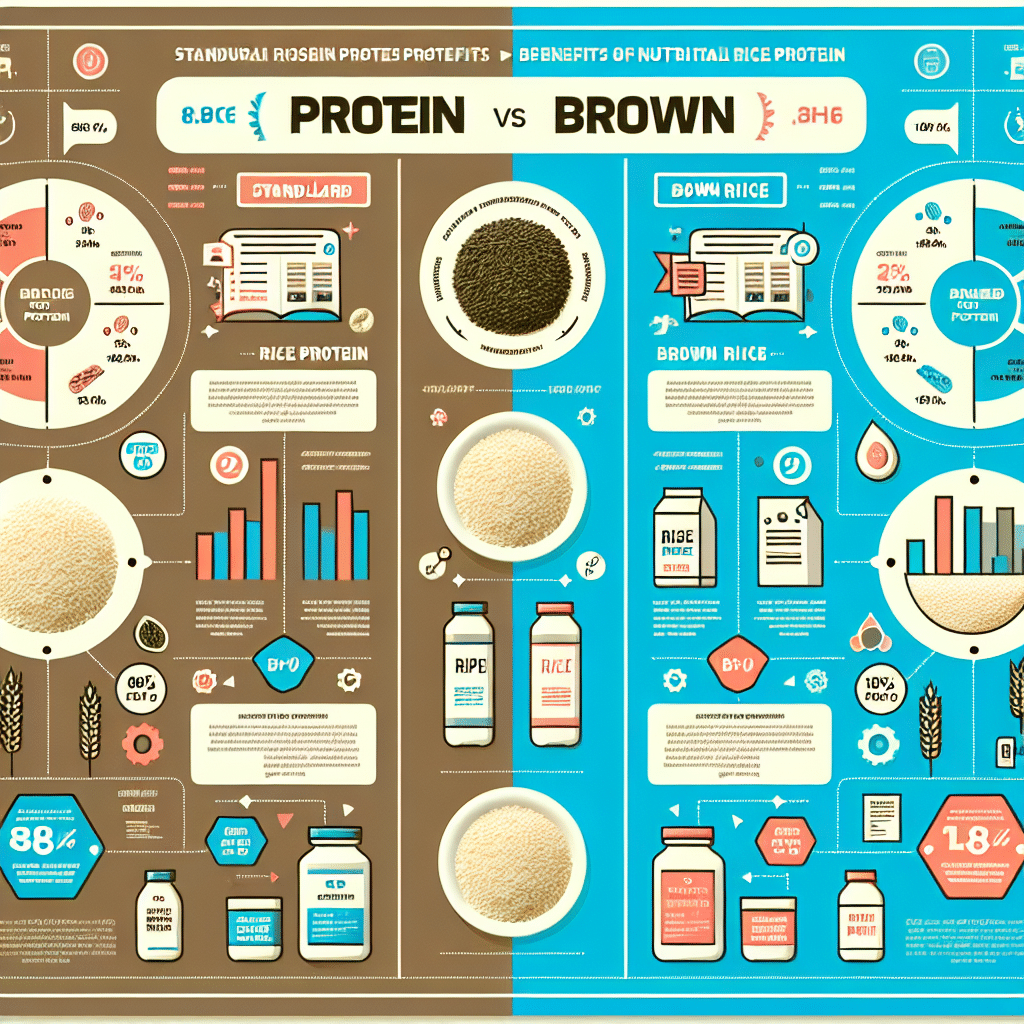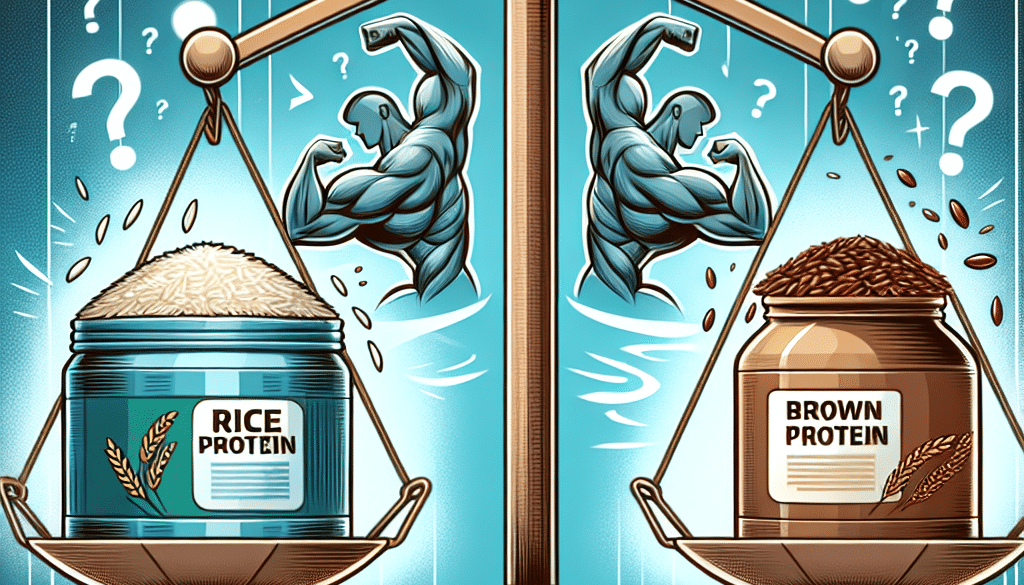Is Rice Protein Better Than Brown Rice Protein?
-
Table of Contents
- Rice Protein vs. Brown Rice Protein: Which is Superior?
- Understanding Rice Protein
- Benefits of Rice Protein
- Understanding Brown Rice Protein
- Benefits of Brown Rice Protein
- Comparative Analysis
- Nutritional Content
- Digestibility
- Amino Acid Profile
- Environmental Impact
- Case Studies and Research
- Conclusion: Which Protein Reigns Supreme?
- Discover ETprotein’s High-Quality Protein Products
Rice Protein vs. Brown Rice Protein: Which is Superior?

When it comes to plant-based proteins, rice protein has become a popular choice for many health enthusiasts and athletes. However, within this category, there’s a debate between the benefits of rice protein and brown rice protein. This article will delve into the nutritional profiles, benefits, and potential drawbacks of each to determine which might be the better option for your dietary needs.
Understanding Rice Protein
Rice protein is derived from white rice that has been treated to remove the carbohydrate content, leaving behind a high-protein powder. It’s a complete protein, meaning it contains all nine essential amino acids, although it’s typically lower in lysine compared to other protein sources.
Benefits of Rice Protein
- Hypoallergenic: Rice protein is a great option for those with allergies to dairy, soy, or gluten.
- Easily Digestible: It’s gentle on the stomach and less likely to cause gastrointestinal issues.
- Plant-Based: Suitable for vegans and vegetarians looking for non-animal protein sources.
- Complete Protein: Contains all essential amino acids necessary for muscle repair and growth.
Understanding Brown Rice Protein
Brown rice protein is extracted from whole grain brown rice, which includes the bran and germ, making it a whole food protein. It retains more of the natural nutrients found in brown rice, such as fiber, vitamins, and minerals.
Benefits of Brown Rice Protein
- Rich in Nutrients: Higher in fiber and essential nutrients compared to white rice protein.
- Antioxidant Properties: Contains antioxidants that can help combat oxidative stress.
- Weight Management: The fiber content can promote satiety and aid in weight management.
- Heart Health: May have benefits for heart health due to the presence of natural oils and fiber.
Comparative Analysis
When comparing rice protein and brown rice protein, it’s important to consider the following factors:
Nutritional Content
Both rice protein and brown rice protein are good sources of plant-based protein. However, brown rice protein typically has a slightly lower protein content due to the presence of additional fiber and nutrients. The choice between the two may depend on whether you prioritize a higher protein intake or a more nutrient-dense profile.
Digestibility
While both proteins are considered easily digestible, the extra fiber in brown rice protein may cause digestive issues for some individuals. If you have a sensitive digestive system, white rice protein might be the better option.
Amino Acid Profile
Both types of rice protein have a complete amino acid profile, but they are lower in lysine. If you’re using rice protein as your primary protein source, you may need to supplement with other lysine-rich foods or combine it with other protein sources.
Environmental Impact
Whole grain brown rice protein may have a slightly higher environmental impact due to the additional resources needed to grow and process the whole grain. However, the difference is minimal, and both are more sustainable than animal-based proteins.
Case Studies and Research
Several studies have looked into the efficacy of rice protein for muscle growth and recovery. A study published in the Nutrition Journal found that rice protein isolate could provide the same benefits for body composition and exercise performance as whey protein. This suggests that rice protein can be an effective alternative to traditional animal-based proteins.
Another study focusing on brown rice protein highlighted its potential for managing blood sugar levels and reducing cholesterol, making it a heart-healthy option.
Conclusion: Which Protein Reigns Supreme?
In conclusion, both rice protein and brown rice protein offer unique benefits. The choice between the two ultimately depends on individual dietary needs, health goals, and personal preferences. If you’re looking for a higher protein content and a hypoallergenic option, white rice protein may be the way to go. On the other hand, if you’re interested in additional nutrients and fiber, brown rice protein could be more beneficial.
It’s also worth noting that incorporating a variety of protein sources in your diet can provide a broader range of nutrients and benefits. Therefore, rather than choosing one over the other, you might consider using both types of rice protein to complement your dietary regimen.
Discover ETprotein’s High-Quality Protein Products
If you’re interested in exploring rice protein options, ETprotein offers a range of high-quality protein products that cater to various needs. Their organic rice protein and brown rice protein are characterized by a neutral taste, non-GMO, and allergen-free attributes. With purity levels over 98%, ETprotein’s products are suitable for a wide array of industries, including nutraceuticals, pharmaceuticals, and food and beverage.
ETprotein’s commitment to excellence and customer satisfaction makes them a top choice for anyone looking to incorporate high-quality plant-based proteins into their diet. To learn more about their offerings or to sample their products, reach out to ETprotein today.
About ETprotein:
ETprotein, a reputable protein and L-(+)-Ergothioneine (EGT) Chinese factory manufacturer and supplier, is renowned for producing, stocking, exporting, and delivering the highest quality organic bulk vegan proteins and L-(+)-Ergothioneine. They include Organic rice protein, clear rice protein, pea protein, clear pea protein, watermelon seed protein, pumpkin seed protein, sunflower seed protein, mung bean protein, peanut protein, and L-(+)-Ergothioneine EGT Pharmaceutical grade, L-(+)-Ergothioneine EGT food grade, L-(+)-Ergothioneine EGT cosmetic grade, L-(+)-Ergothioneine EGT reference grade and L-(+)-Ergothioneine EGT standard. Their offerings, characterized by a neutral taste, non-GMO, allergen-free attributes, with L-(+)-Ergothioneine purity over 98%, 99%, cater to a diverse range of industries. They serve nutraceutical, pharmaceutical, cosmeceutical, veterinary, as well as food and beverage finished product distributors, traders, and manufacturers across Europe, USA, Canada, Australia, Thailand, Japan, Korea, Brazil, and Chile, among others.
ETprotein specialization includes exporting and delivering tailor-made protein powder and finished nutritional supplements. Their extensive product range covers sectors like Food and Beverage, Sports Nutrition, Weight Management, Dietary Supplements, Health and Wellness Products, and Infant Formula, ensuring comprehensive solutions to meet all your protein needs.
As a trusted company by leading global food and beverage brands and Fortune 500 companies, ETprotein reinforces China’s reputation in the global arena. For more information or to sample their products, please contact them and email sales(at)ETprotein.com today.












